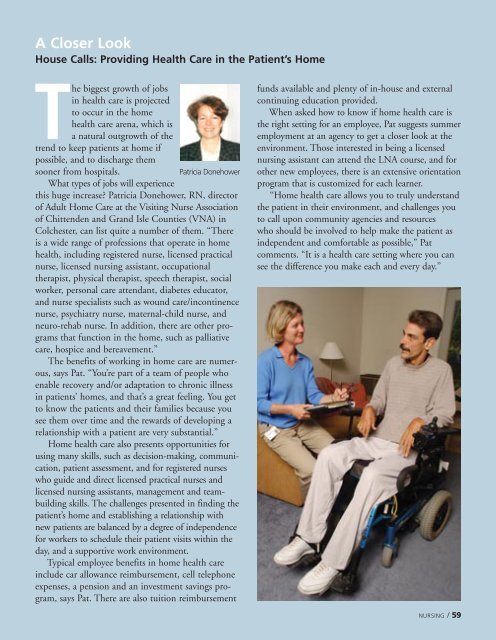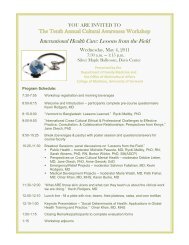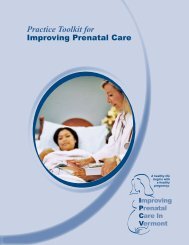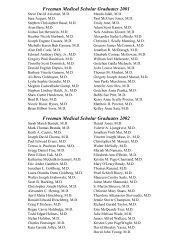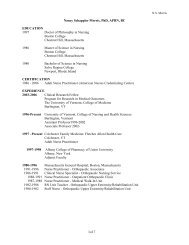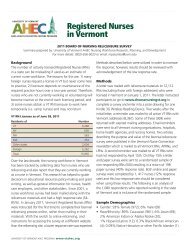Health Careers - College of Medicine - University of Vermont
Health Careers - College of Medicine - University of Vermont
Health Careers - College of Medicine - University of Vermont
Create successful ePaper yourself
Turn your PDF publications into a flip-book with our unique Google optimized e-Paper software.
A Closer Look<br />
House Calls: Providing <strong>Health</strong> Care in the Patient’s Home<br />
The biggest growth <strong>of</strong> jobs<br />
in health care is projected<br />
to occur in the home<br />
health care arena, which is<br />
a natural outgrowth <strong>of</strong> the<br />
trend to keep patients at home if<br />
possible, and to discharge them<br />
sooner from hospitals.<br />
Patricia Donehower<br />
What types <strong>of</strong> jobs will experience<br />
this huge increase? Patricia Donehower, RN, director<br />
<strong>of</strong> Adult Home Care at the Visiting Nurse Association<br />
<strong>of</strong> Chittenden and Grand Isle Counties (VNA) in<br />
Colchester, can list quite a number <strong>of</strong> them. “There<br />
is a wide range <strong>of</strong> pr<strong>of</strong>essions that operate in home<br />
health, including registered nurse, licensed practical<br />
nurse, licensed nursing assistant, occupational<br />
therapist, physical therapist, speech therapist, social<br />
worker, personal care attendant, diabetes educator,<br />
and nurse specialists such as wound care/incontinence<br />
nurse, psychiatry nurse, maternal-child nurse, and<br />
neuro-rehab nurse. In addition, there are other programs<br />
that function in the home, such as palliative<br />
care, hospice and bereavement.”<br />
The benefits <strong>of</strong> working in home care are numerous,<br />
says Pat. “You’re part <strong>of</strong> a team <strong>of</strong> people who<br />
enable recovery and/or adaptation to chronic illness<br />
in patients’ homes, and that’s a great feeling. You get<br />
to know the patients and their families because you<br />
see them over time and the rewards <strong>of</strong> developing a<br />
relationship with a patient are very substantial.”<br />
Home health care also presents opportunities for<br />
using many skills, such as decision-making, communication,<br />
patient assessment, and for registered nurses<br />
who guide and direct licensed practical nurses and<br />
licensed nursing assistants, management and teambuilding<br />
skills. The challenges presented in finding the<br />
patient’s home and establishing a relationship with<br />
new patients are balanced by a degree <strong>of</strong> independence<br />
for workers to schedule their patient visits within the<br />
day, and a supportive work environment.<br />
Typical employee benefits in home health care<br />
include car allowance reimbursement, cell telephone<br />
expenses, a pension and an investment savings program,<br />
says Pat. There are also tuition reimbursement<br />
funds available and plenty <strong>of</strong> in-house and external<br />
continuing education provided.<br />
When asked how to know if home health care is<br />
the right setting for an employee, Pat suggests summer<br />
employment at an agency to get a closer look at the<br />
environment. Those interested in being a licensed<br />
nursing assistant can attend the LNA course, and for<br />
other new employees, there is an extensive orientation<br />
program that is customized for each learner.<br />
“Home health care allows you to truly understand<br />
the patient in their environment, and challenges you<br />
to call upon community agencies and resources<br />
who should be involved to help make the patient as<br />
independent and comfortable as possible,” Pat<br />
comments. “It is a health care setting where you can<br />
see the difference you make each and every day.”<br />
NURSING / 59


